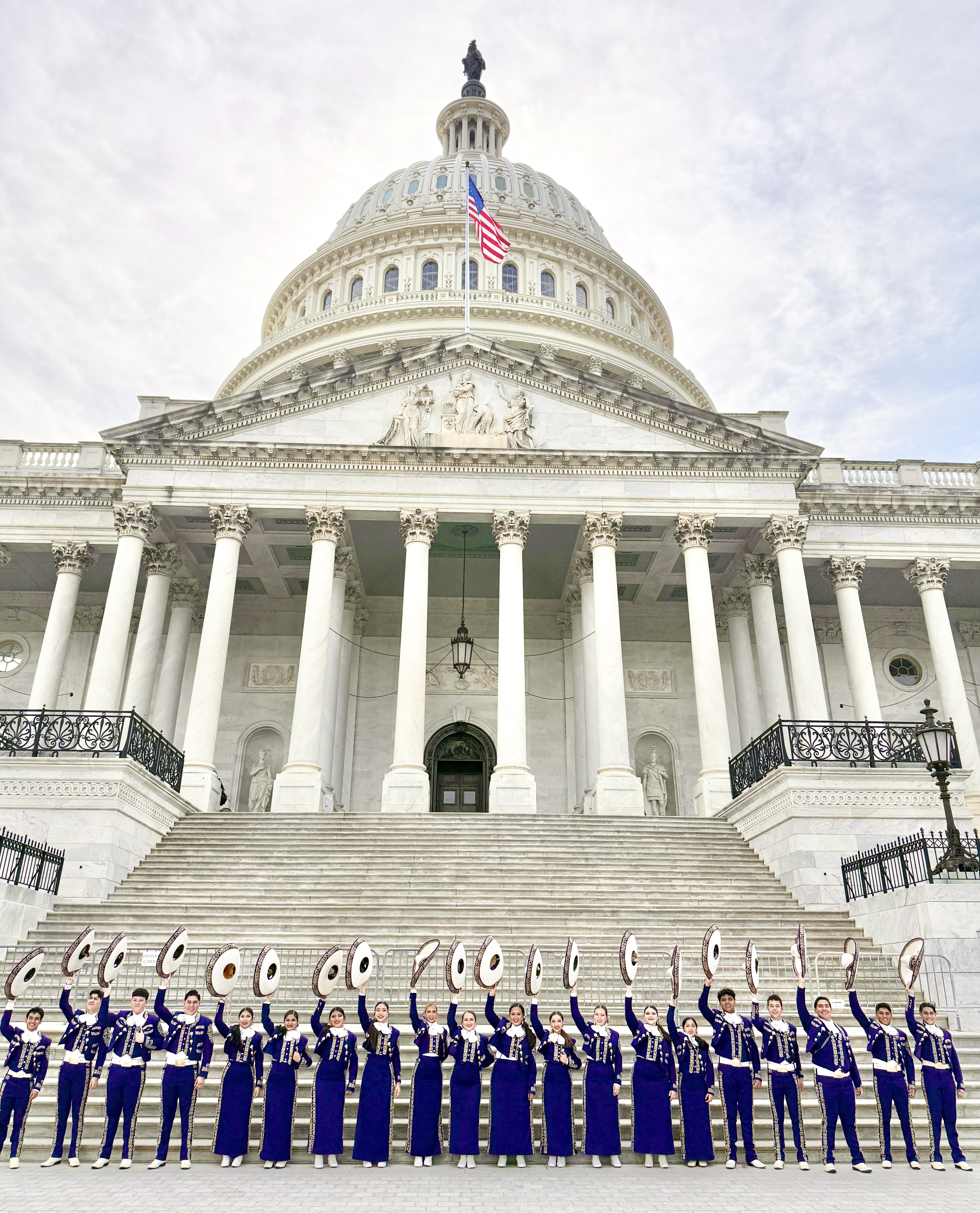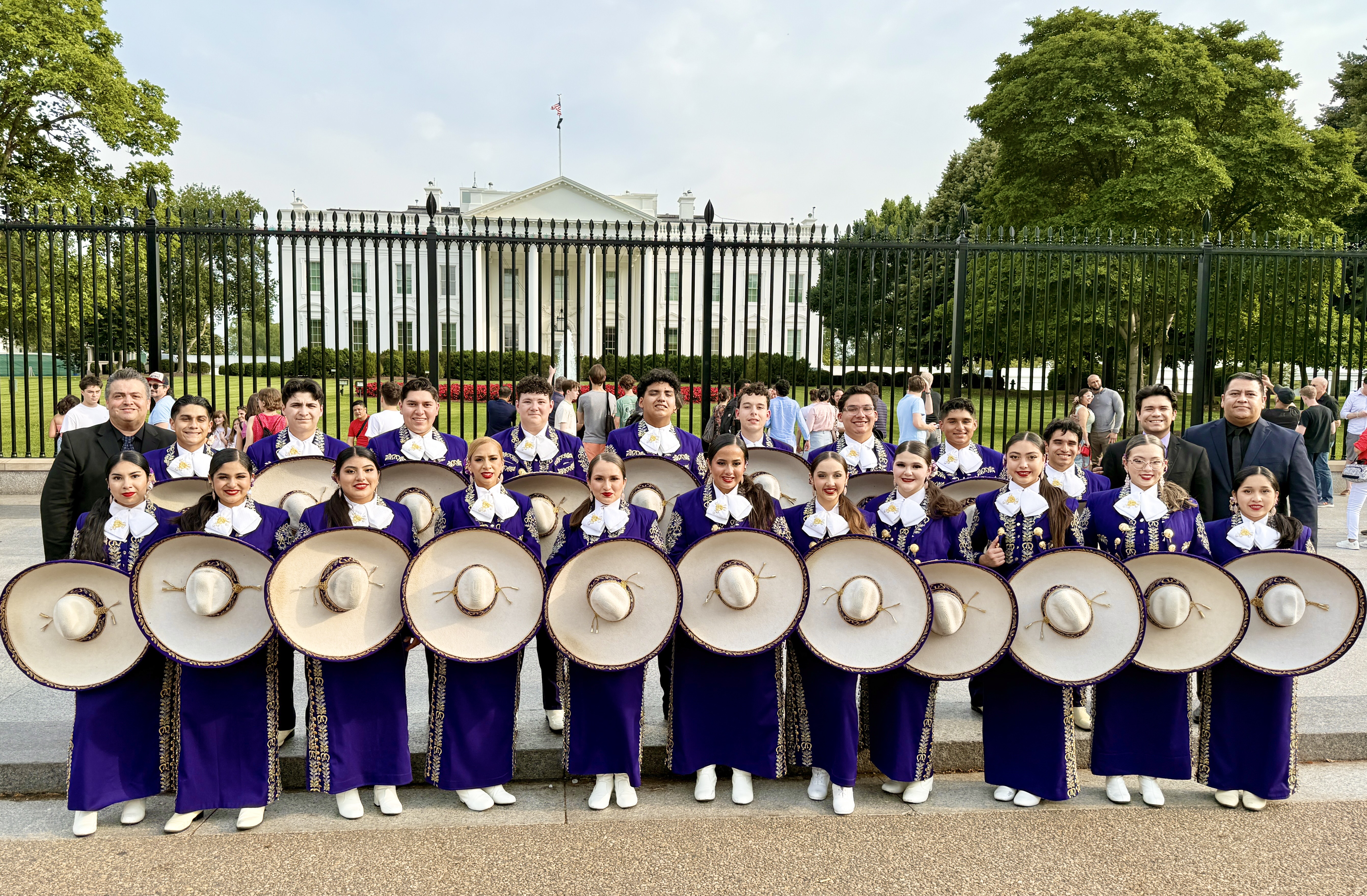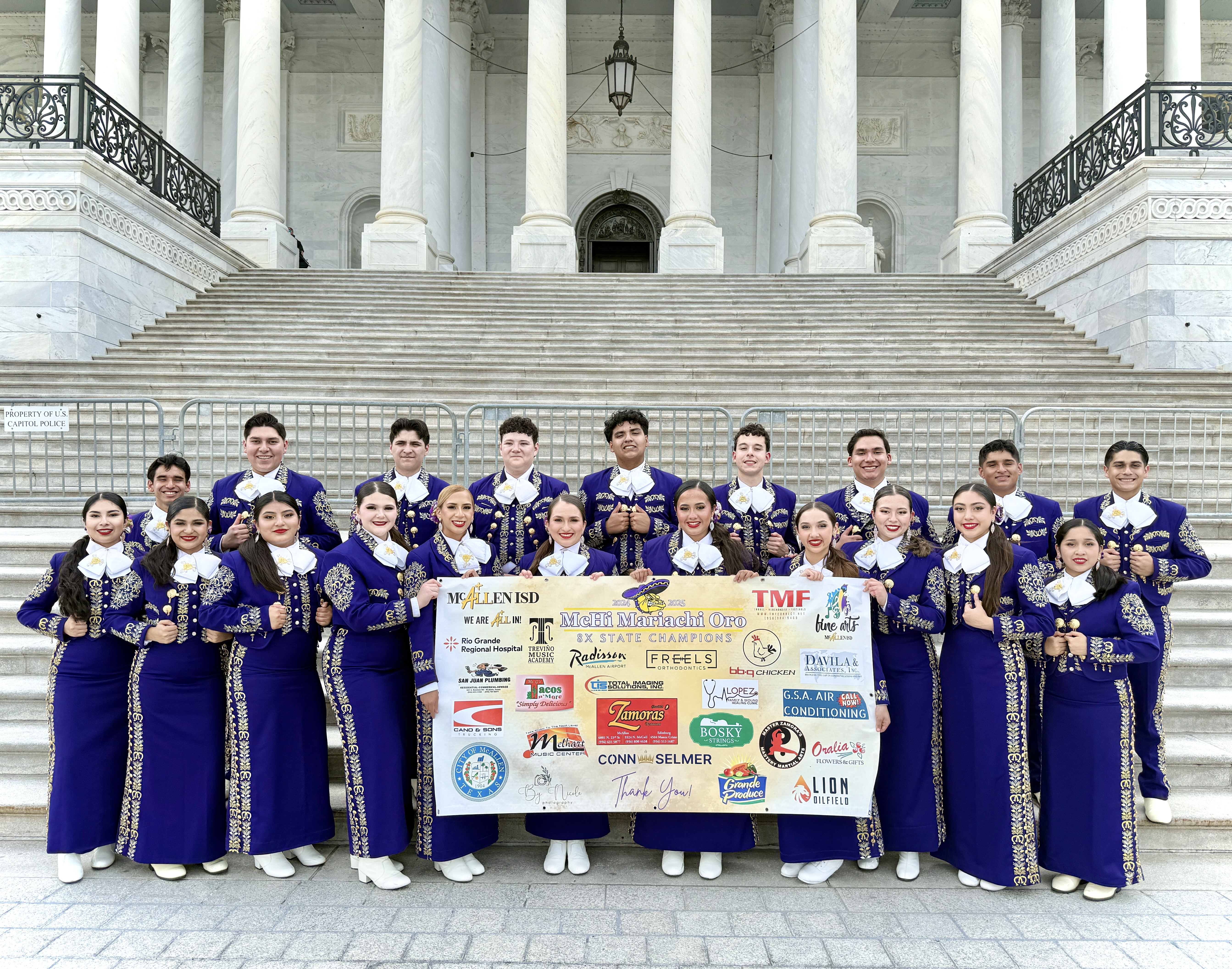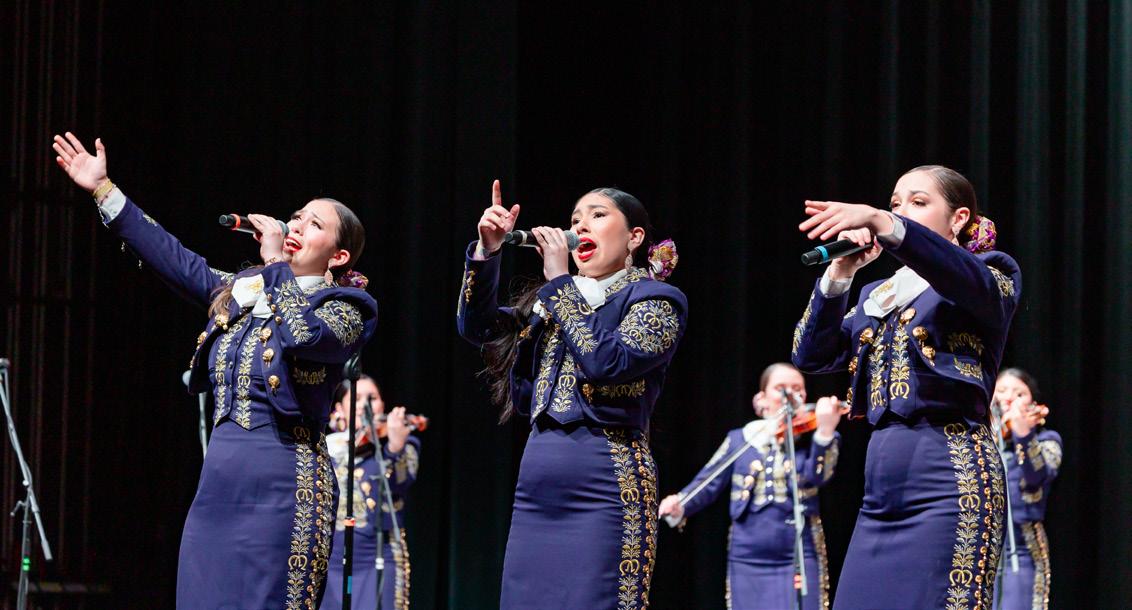
12 minute read
Mariachi Oro: Four Decades of Tradition & Triumph at McAllen High School
By Dr. Kimberly Selber
Photography Courtesy of Mariachi Boosters, Nicole Photography & Magallón Photography
In the spring of 2025, McAllen High School’s Mariachi Oro achieved what few high school ensembles can claim: clinching its eighth Texas state mariachi championship title while also earning a tenth consecutive Division I superior rating at the UIL State Mariachi Festival – a feat only three schools in Texas have ever matched. What makes their feat even more remarkable is that they are the only school in the state to have achieved it without the advantages of a full-fledged middle school program.
Their accolades have opened some remarkable doors. The group has performed at the Hollywood Bowl in California, in front of 18,000 music fans, three times at the Mariachi USA Festival, and beneath the bright lights of Times Square in New York City. Last June, Mariachi Oro took the stage beneath the golden ceilings of New York’s storied Carnegie Hall, joining the inaugural Viva El Mariachi! Homenaje a la Música Mexicana festival. “We were very excited, very humbled,” recalls head director Alex Treviño of the Carnegie Hall invitation, adding that the most beautiful feeling was seeing his students represent their heritage. This month, they journey to Washington, D.C., where they’ll be honored on the floor of the U.S. Congress, perform at some high-profile events, and receive a private tour of the White House.
For the South Texas community that Mariachi Oro represents, these recent triumphs are the latest crescendo in a story four decades in the making. To understand how a humble after-school group grew into an award-winning ensemble gracing national stages, one must trace its roots back to the 1980s, when a new tradition was just beginning to take shape.



Roots in Culture and Community
MariachiOro’s origins date back to an era when mariachi music was only just beginning to enter public school programs in South Texas. In the early 1980s, visionary educators in the Rio Grande Valley championed the idea of bringing Mexican mariachi music into local classrooms. Inspired by the success of those pioneers, McAllen ISD soon followed suit. In 1988, Terry Hernández of McAllen High School founded the mariachi ensemble, which would later be known as Mariachi Oro (Spanish for “Gold”). From the beginning, the ensemble was aptly named: these students aimed to set a gold standard in preserving and performing the music of their heritage.
The early days of Mariachi Oro were modest – just a handful of students picking up guitars, violins, and trumpets after school, learning folk standards from local mentors. Yet the cultural significance of that start cannot be overstated. For many families in the Rio Grande Valley, seeing mariachi music valued at school was a point of pride. Songs that abuelitos had long sung at weddings or community fiestas were now being taught and performed on campus. In a region where nearly everyone has roots in Mexico, mariachi was more than just an extracurricular activity – it was a bridge between generations. Elders would come to campus performances, eyes shining, as teenagers played the same sones and corridos they’d grown up hearing. By teaching teens the art of mariachi, the program was also teaching them about their own identity and history. Students gained pride in being bilingual and bicultural, and their parents and grandparents felt pride that the younger generation was celebrating their traditional music.
Through the late 1980s and 1990s, McAllen High’s mariachi program steadily grew in skill and reputation. By the 2000s, Mariachi Oro was drawing crowds at UIL contests and mariachi festivals, helping put the Rio Grande Valley on the map in the mariachi world. With each performance, the students learned that mariachi demands both discipline and heart. Their directors and mentors often reminded them that mariachi isn’t easy – one has to pour their soul into it. Students learned to balance academics with long evening rehearsals, mastering standard arrangements of classics like “El Son de la Negra” and “Volver, Volver” as well as more advanced professional-level arrangements by their own directors, such as “María Chuchena” and “Veracruz Puerto Querido.” They weren’t just learning notes; they were learning to express deep cultural emotions through music. Little did they know that even greater heights lay ahead.

Striking Gold: Championships and Accolades
If the first two decades established Mariachi Oro as a regional treasure, the next two would transform it into a state and national powerhouse. A turning point occurred in the early 2010s with the emergence of a new generation of talented musicians and dedicated leadership. After years of coming close, McAllen High’s mariachis finally captured the ultimate prize: on February 8, 2014, Mariachi Oro delivered a performance at the state finals in San Antonio and won the Texas Class 5A state championship. Judges awarded the group straight Division I superior ratings from all five judges – the highest marks possible.
That 2014 championship win sparked a dynasty. In the years since, Mariachi Oro has amassed eight state titles (2014, 2015, 2016, 2017, 2019, 2020, 2022, and 2025), dominating competitions hosted by the Texas Association of Mariachi Educators (TAME) and the University Interscholastic League (UIL).
Year after year, the students of Mariachi Oro have proven they can compete with the very best, not just in Texas but anywhere mariachi is played. In 2021, Mariachi Oro earned a major national accolade by being named a “National Youth Mariachi of Distinction,” one of only 10 programs in the U.S. to receive a prestigious Maestro Award that year. It is no surprise that McAllen ISD, notably, has been recognized as one of the nation’s Best Communities for Music Education.
While Mariachi Oro has won ensemble awards, many members have also been recognized individually. The group’s vocalists, for example, have won Grand Champion Vocalist titles at the renowned Mariachi Vargas Extravaganza multiple times. In December 2020, senior Ashley Treviño was crowned the Mariachi Vargas Extravaganza Best in the U.S. Grand Champion Vocalist of the Year, outperforming 35 finalists from across the country. According to Mariachimusic.com, “Ashley stunned judges with her sweet yet powerful vocals and dynamic interpretation of the Más No Puedo lyrics.”

The Treviño Legacy: Leading from Within
At the heart of Mariachi Oro’s sustained success is someone who has lived every side of the program—student, director, and parent. Alex Treviño first stepped into the world of mariachi in the 1990s as a violinist with Mariachi Oro while a student at McAllen High. It was through the district’s mariachi ensemble that he also met his future wife, Jessica, then a member of Memorial High’s mariachi group.
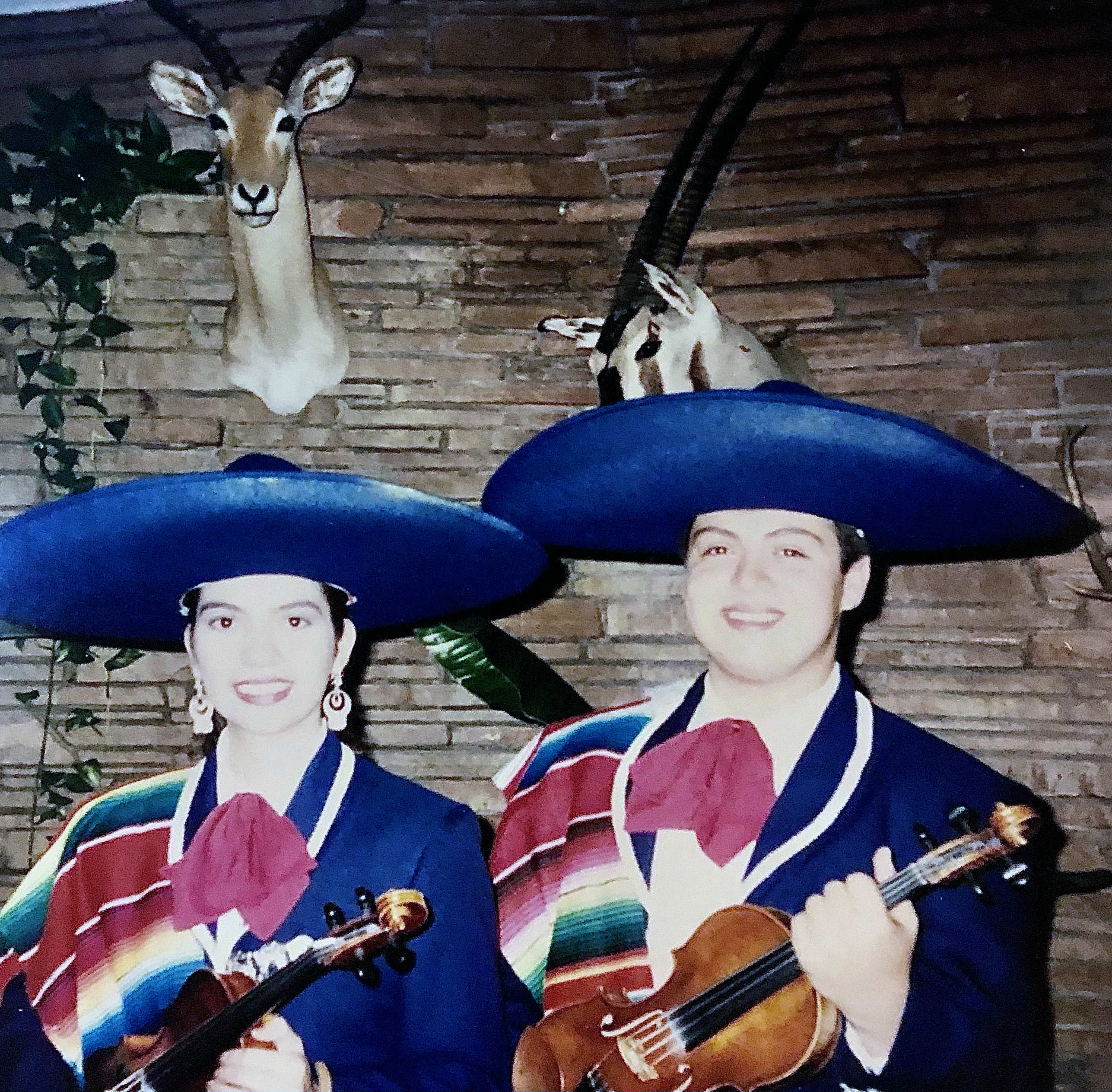
The experience sparked a lifelong passion. After college and teaching stints across the Rio Grande Valley, Treviño found his way back to where it all began. In 2007, he returned to McAllen High as head mariachi director.
Over the past 18 years, Treviño has more than fulfilled the vision he brought home. He has helped cultivate the program into a juggernaut, guiding Mariachi Oro to ten straight superior ratings at the UIL state festival and eight state titles in 11 years. Under his leadership, “McHi’s” mariachi has truly struck gold. But beyond the trophies, Treviño’s legacy is defined by the family atmosphere and pride he has nurtured within the program.
In fact, for Treviño, Mariachi Oro is family in the most literal sense. All three of his children – Alex II, Ashley, and Andrew –grew up wearing the purple-and-gold trajes of McAllen High’s mariachi. His eldest, Alex Treviño II, was a standout violinist and vocalist who graduated in 2018 as a three-year State UIL Outstanding Performer. Alex II went on to perform with UTRGV, Los Arrieros, and the world-famous Grammy Award-winning Mariachi Los Camperos and earned a degree in music education. In 2024, he accepted a position as the lead teaching artist for a mariachi and arts academy in California.

Meanwhile, Treviño’s daughter, Ashley, a McHi Class of 2021 graduate, made her mark as an extraordinary violinist and vocalist. As mentioned, in 2020, she became the Grand Champion Vocalist of the Year at the Mariachi Vargas Extravaganza, effectively earning the title of best mariachi singer in the nation beating out middle school, high school, and college/ university vocalists. She also earned a spot in the TMEA All-State Mariachi ensemble in 2021 as a violinist and vocalist. Today, Ashley is in her senior year of college at the University of Texas at Austin, where she majors in Human Dimensions of Organizations. However, she hasn’t left music behind – she still finds time to sing and perform. “Many of our former members put themselves through college performing with mariachi groups,” Director Terviño stated. “Some are earning up to $100 an hour in central Texas or $75 and up here in the RGV.”

Then there’s the youngest, Andrew, who distinguished himself as one of the top student violinists in Texas, becoming a three-time All-State musician (twice in the All-State mariachi ensemble and once in the All-State orchestra) and a four-time State UIL Outstanding Performer in orchestra and mariachi. In his sophomore year, he not only made the All-State Mariachi but also earned first-chair violin, meaning he was ranked the best high school mariachi violinist in Texas that year. Graduating in 2024 and accepted into several high-profile music programs and universities, Andrew decided to attend UTRGV and to be a member of the best collegiate mariachi in the nation, Mariachi Aztlán, where he is the only freshman in the university’s top performing group. He joins four other McHi mariachi alums who make up one-third of the overall ensemble. It’s no surprise that under their father’s guidance, the Treviño siblings became known as the “first family” of McHi mariachi.
But the Treviño family isn’t the only one. “Over the last few years—and again this year—we’ve had students whose parents were once members of Mariachi Oro,” notes Director Treviño. One is current junior and trumpeter Brandon Chavero, whose father, Frank Chavero, played trumpet with the group in the early 1990s. Another is alum Leo García, who performed with Mariachi Oro in the mid-’90s and is now the proud parent of Lea (Class of 2024) and Mía García (Class of 2023), both members of the ensemble.
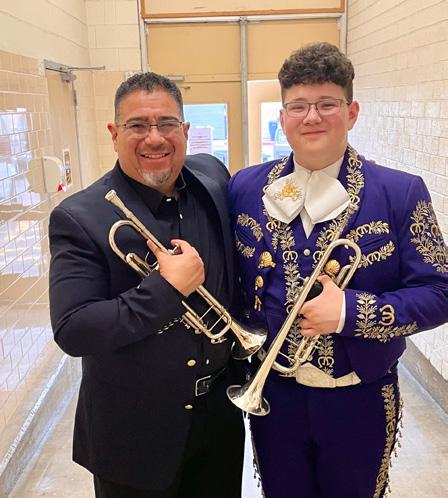
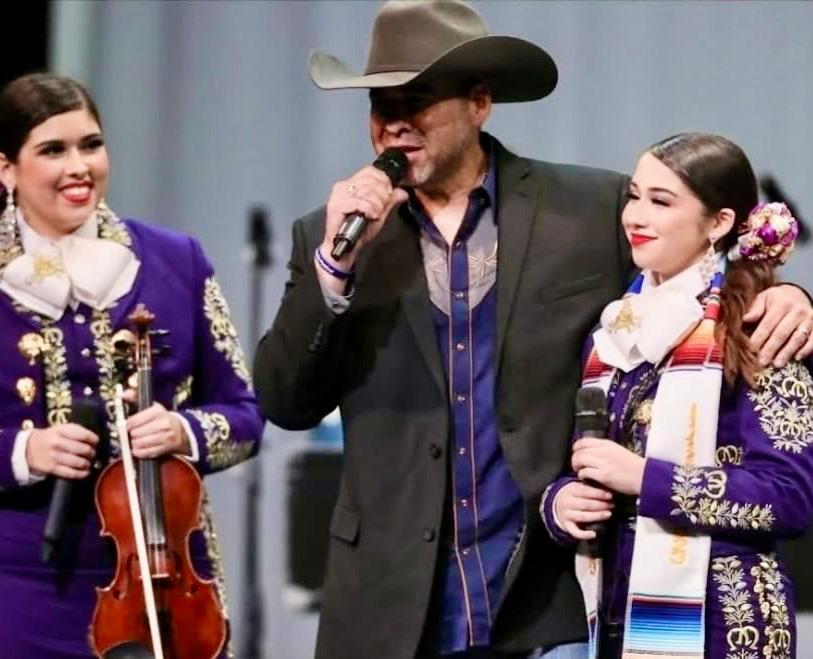
Treviño is also quick to point out that he’s not alone in shaping Mariachi Oro’s success. He credits a strong team of assistant directors, Bernardo Aldava and alumni-turned-mentor Neri Fuentes, who work with him to perfect the group’s sound. Treviño attributes their success to the experiences and knowledge they have gained as members of the three-time Grammy Award-nominated Mariachi Los Arrieros Del Valle, a professional group comprised of music educators from the RGV. Together, they have forged a winning formula: high standards, heartfelt mentorship, and an unwavering sense of familia. It’s common to find alums dropping by rehearsals to encourage the current students. He firmly believes that every new crop of freshmen can rise to the legacy if given enough patience and passion – and time after time, his students have proven him right.
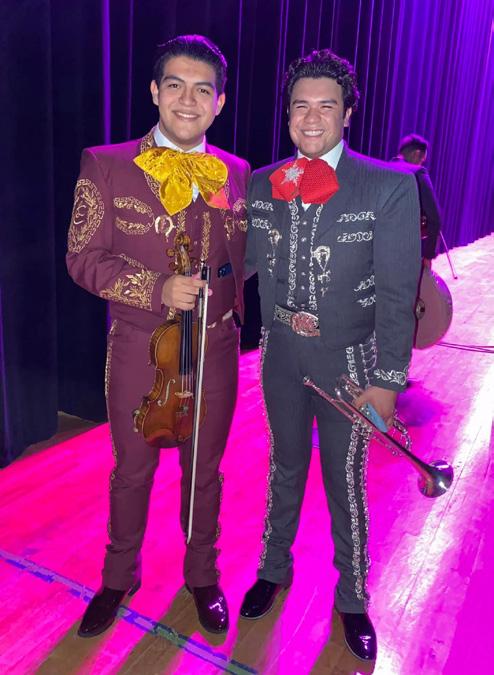
More Than Music: Lifelong Lessons Through Mariachi
Beyond the trophies and trips, those closest to Mariachi Oro will tell you its true impact is measured in personal growth and cultural enrichment. Being part of this mariachi is like being part of a big family. Teenagers enter as shy freshmen plucking at violins and leave as confident young adults who’ve performed under pressure, led their peers, and connected deeply with their heritage along the way. It’s not uncommon to see students moved to tears during a heartfelt performance. Through mariachi, students learn that music isn’t just notes on a page; it’s a living connection to community, history, and personal identity.
The program also instills discipline and ambition. Members of Mariachi Oro must juggle rigorous rehearsals (often two hours after school, plus weekends during competition season, which is often year-round) with their academic workload. Many alumni later say that balancing mariachi and homework in high school made college or career challenges feel easier. And the teamwork within the group is second to none. Unlike a traditional orchestral setting where one might vie for first chair, in mariachi, every member is both a soloist and an ensemble player/vocalist, and the group succeeds or fails together.
As Mariachi Oro enters its fourth decade, the group continues to evolve—mastering both traditional repertoire and ambitious contemporary arrangements like Laufey’s “From the Start” and a crowd-favorite tribute to Patsy Cline. Their performances can be found on YouTube (@McHiMariachiOro), social media under McHi Mariachi Oro, and streaming platforms, including Apple Music, iTunes, and Spotify.
Community support remains the heartbeat of the program. Local businesses help fund travel, parents pitch in with costume tailoring and fundraising efforts, and school administrators support the group at every turn. Looking ahead, Director Treviño is working with McAllen ISD to develop a stronger pipeline of young musicians through expanded middle school feeder programs, starting as early as sixth grade. It’s all part of a larger vision: to preserve the rich tradition of mariachi while preparing the next generation to carry it forward—with pride, passion, and a heart of gold.
New Photos from Mariachi Oro's trip to Washington, D.C. in June 2025.
